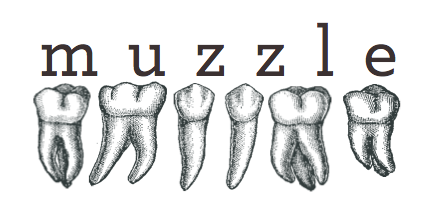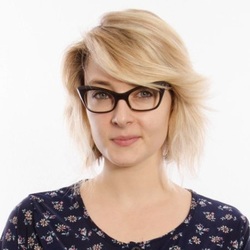We are so excited to share our new logo from poet and web developer Meghann Plunkett!!Q&A with Meghann Plunkett*Questions from Stevie Edwards, Editor-in-Chief SE: I know you primarily through your work as a poet, but you also have a background as a web developer. Do you see any interplay between your interests and talents in poetry and coding? MP: I’d say that I see a connection between writing code and editing poetry for sure. I was a poet long before I was introduced to web development and one of the first things I became delighted by was the notion that code could become more “elegant” by being reworked or reorganized. This made me literally clap my hands and spin around. I feel this is what happens when we edit our poems or stories into the most effective shape we can. And the editing process is never over. I love the idea that these two very different disciplines are constantly striving, chiseling and reaching for elegance. *** SE: You recently moved from NYC for an MFA program in the great metropolis of Carbondale, IL. Could you tell me a little bit about your decision to pursue an MFA and how you’re finding the experience? MP: Haha. Yes, it’s certainly been a change. I think I always knew that I was interested in pursuing an MFA at some point in my life, but I wanted to be in the world first. After graduating from Sarah Lawrence I had almost every job imaginable. I worked as a shop girl at the Plaza Hotel, I waited tables, I house sat, pet sat, baby sat and for a time I boomed sound for a terrible reality television show called “Street Court,” which was like Judge Judy except “in the street” ..literally. After learning web development and finding a stable job, I realized how much I missed being able to dedicate my mind and life to poetry. That was the turning point and I knew it was time. I am just ending my first year and so far, I couldn't be happier. My cohort is filled with talented, kind and motivated people. My professors, Judy Jordan and Allison Joseph are beams of motivation and wise insight. Being in an MFA is special. It creates an environment that allows poetry to be the most important thing. When does that ever happen? *** SE: You recently had an article published in Luna Luna Magazine about—and I hope this isn’t an over-generalization—people who publicly advocate for supporting women in abusive relationships but aren’t advocates for women they encounter in their daily lives. In this article you suggest we ask ourselves “how we each have helped cycles of abuse by doing nothing, by doubting the victim and shying away.” Do you think this challenge to victim-blaming shows up in your poetry at all? MP: I’d say that is a good summary of my intentions for this article, yes. I’d say that I have been shifting my life and my work to really focus on female issues in general, and victim blaming is certainly a part of that. I have a lot of current work that is not out in the world yet that deals with these issues. I’m interested in looking at these issues, victim blaming for example, and studying the process from external to internal. This isn’t in the Luna Luna article, but victim blaming begins from an external source and can often result in an internal dialogue with yourself. It is easy to become your own oppressor in this way. This concept is fascinating and heartbreaking to me. It’s scary too, to look at my own internal landscape and ask myself how much of this was told to me? How much of that so I keep telling myself. *** SE: I know this is a huge and not easily answerable question, but do you have any thoughts on how to disrupt the seeming complacency toward sexism within the poetry community? MP: This is hard. I just thought about it and I hate my answer because it places a lot of the action and the fixing mostly on women. But I think that the only way to eradicate sexism and harassment in any community is to not stay silent. The more we talk, the more awareness spreads. Often when I stayed silent in the past it was because I assumed I was alone and that these actions from a certain person were personal problems. What I have learned is that if there is a source of hate being directed at you, it is also being directed at others. When I realized this, I started to see the problem as systemic and get angry. Speaking out is the most commonplace super power I have encountered. It is magic. Oh and also, you don’t have to be a victim to speak up. Men see it all the time too. Say something. *** SE: Do you have any favorite recent feminist poetry reads? MP: I’m not sure how these women might feel to have this label put on them, but it is my opinion that every female poet with a strong political voice is a feminist poet. There are so many of them, how to narrow them down? I’ll just list those whose name begin with the letter A: Aja-Monet is just one of my favorite activist and women in general. Aimee Baker has a long poem about women who have been abducted. Ada Limon’s newest book Bright Dead Things. Aimee Nezhukumatathil’s poem about C-Sections. Ansel Elkin’s book Blue Yodel. Angel Nafis and her book Black Girl Mansion. *** SE: What was the last poem that really moved you? MP: Ansel Elkin’s "Reverse: A Lynching" from her book Blue Yodel. So Powerful. *** SE: How long have you been writing poetry. What sparked your interest? MP: I’m not sure. I remember writing autobiographies for my teddy bears as a kid. But, I don’t think I really started writing until college. Matthea Harvey and Jeffrey McDaniel opened my eyes to what poetry was and could be. *** SE: So, let’s say you sit down with a computer or with a notebook or etch-a-sketch or whatever it is use for writing and poems and nothing comes out. What do you do? MP: I usually end up cleaning. Monotonous things often help me get into a creative space. I might be able to visually see how prolific I am by gauging how dirty my house is. *** SE: Are there any TV shows you’ve recently binged watched? MP: Jessica Jones. Dear Lord. *** SE: Favorite treat? MP: Pickles. Ice cream. Ramen. *** SE: Favorite thing to read that isn't poetry? MP: I’ve been reading a lot of Neil Gaiman as of late. So, magical short stories? Note: Meghann's poems "Adolescence" and "Long Distance Larceny" appeared in our Winter 2014 issue, and more about her work as both a web developer and a poet can be found on her website: meghannplunkett.com
|
Archives
June 2024
Categories |



 RSS Feed
RSS Feed